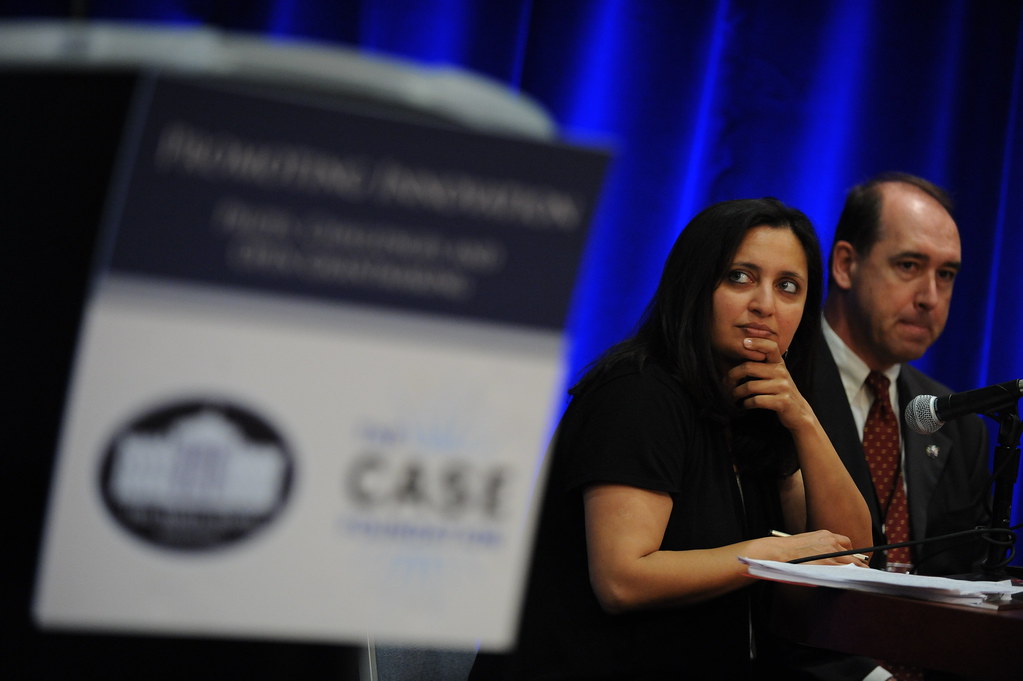What is the spirit of a revolver? Perhaps it’s best described as someone who advances “the increasingly influential private-sector approach to world-changing.” That, after all, is how Anand Giridharadas, in his essential book Winners Take All: The Elite Charade of Changing The World, once described Sonal Shah’s current work.
Shah runs Georgetown University’s Beeck Center for Social Impact and Innovation, which works as an “orchestrating broker across sectors to increase the probability of scaled positive impact, ultimately provoking grassroot and institutional leaders to think, behave, and collaborate differently toward a shared vision of prosperity for all.” (We challenge you, reader, to strip away the buzzwords and deduce what its employees actually do all day.) Shah was formerly an economist and policy designer for Google, Goldman Sachs, and the Obama White House. She was also a major policy advisor to Pete Buttigieg in his 2020 presidential campaign, on which she personally headlined at least 22 high-dollar fundraisers, dissolving any ethical wall between the campaign’s policy shop and fundraising apparatus.
Here are just a few concerning elements of Shah’s history:
Shah’s work in and out of government is “based on a simple idea: we cannot drive lasting change by creating new top-down programs from Washington.”
- Shah articulated her philosophy of governance in a 2013 Forbes article: “In a bygone era government was solely responsible for addressing the Nation’s biggest problems, from building the interstate highway system to the New Deal social programs. However, today’s challenges are more complicated and interconnected than ever before and cannot be solved by a single actor or solution. That is why government has an opportunity to engage with the actors in the Impact Economy from non-profits to businesses. The results could create jobs, drive new solutions, and catalyze a vibrant new economy.”
- As Anand Giridharadas wrote of this article, “There was no mention of the fact that this method, by putting the moneyed into a leadership position on public problem-solving, gave them the power to thwart solutions that threatened them.”
- Shah established the Obama White House’s Office of Social Innovation and Civic Participation, which coordinated with and funded nonprofits addressing social issues, often employing methodology from behavioral economics to make policy decisions. Some would argue that many of these nonprofits were filling social gaps that should have been addressed by dedicated public policy, instead of private or philanthropic activity.
- Shah led the global development work of Google’s corporate philanthropy, Google.org, before joining the Obama White House. She returned to Google.org after her time in government.
- Shah designed Goldman Sachs’ early corporate policies on environmental considerations in investing. “She trained bankers to ask environmental questions, managed the grants to non-profits, and worked with their real estate team on how to build more green buildings,” according to a Buttigieg campaign spokesman. Goldman was and remains an investor in the fossil fuel industry, and only stopped funding Arctic drilling in 2019, years after Shah had departed the company. Goldman recently nominated the CFO of oil company Royal Dutch Shell to its board of directors.
Shah personally attended high-dollar fundraising events for the Buttigieg campaign, dissolving any wall between fundraising and policy development.
- Shah was the advertised headliner for multiple high-dollar fundraising events on the Pete Buttigieg 2020 presidential campaign. Traditionally, policy directors do not fundraise on a candidate’s behalf to maintain an ethical wall between the interests of wealthy donors and the policies advocated for by a candidate.
- Shah headlined at least 22 high-dollar fundraisers between October 2019 and February 2020. These included cocktails, pancake breakfasts, and video calls with Shah which “investors” (the Buttigieg campaign’s term for high-dollar donors) could buy their way into.
- When questioned by The Intercept about Shah’s fundraising, the Buttigieg campaign did not directly address the issue — her name appears nowhere in their statement, which instead proclaims that Democrats could not go into an election against Donald Trump “with one hand tied behind our backs.”
Shah has criticized the same philanthropic measures for which she advocates.
- In an interview with Oxford University in October 2019, Shah said “I think philanthropy and social services become a very top-down process, where we design our theory of change from the top without ever asking the people whom we serve whether the services are working for them. And yet we all mouth the words ‘bottom-up development’ and ‘bottom-up transformation.’ The tech community starts with ‘we do data-driven decision-making.’ But we never ask the poor what they need. Forget the poor — middle class! We never actually ask what they need, we tell them what we’re going to deliver.”
- Much of the Beeck Center’s current work focuses on praising tech sector innovations and positing that they should be applied toward solving global problems, despite Shah’s criticism. Moreover, “data-driven decision-making” is a central goal of the “evidence-based policy” regime for which Shah advocated in the White House.
PHOTO: “Sonal Shah, Director of the Office of Social Innovation, and Andrew Petro of NASA” by Case Foundation is licensed under CC BY-NC-ND 2.0.

